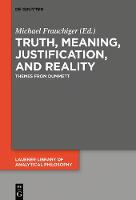


|
|
|
books
| book details |
Truth, Meaning, Justification, and Reality: Themes from Dummett
Edited by Michael Frauchiger

|
This book is currently unavailable. Enquire to check if we can source a used copy
|
| book description |
This collection concentrates on vital themes from Michael Dummett, one of the most influential and creative analytic philosophers of our time. The contributors, who include some of Dummett's distinguished former students, critically reflect on various concerns of Dummett's ground-breaking work in philosophy of language, metaphysics, and philosophy of mathematics and logic. The essays direct towards aspects of Dummett's pioneering work in the history of analytical philosophy, particularly his interpretations of the works of Frege and of Wittgenstein, which in conjunction with Dummett’s own highly original ideas on truth and meaning have shaped decisive contemporary debates concerning notably the distinction between realism and anti-realism. Further, the volume includes a cheerfully serious excursion into popular philosophy by Dummett himself and reveals less known facets of Dummett's many-sided work and activities such as his political philosophy of immigration and asylum, and beyond that, his untiring and warm-hearted campaign for racial justice and humanity. Contributors: Michael Dummett, Eva Picardi, Crispin Wright, Timothy Williamson, Ian Rumfitt, Daniel Isaacson, Dag Prawitz, Dale Jacquette, Alex Burri, Michael Frauchiger.
| product details |
Normally shipped |
Publisher | De Gruyter
Published date | 20 Nov 2017
Language |
Format | Digital (delivered electronically)
Pages | 260
Dimensions | 0 x 0 x 0mm (L x W x H)
Weight | 0g
ISBN | 978-3-1104-5839-8
Readership Age |
BISAC |
| other options |
|
|
|
To view the items in your trolley please sign in.
| sign in |
|
|
|
| specials |
|
|
Let's stare the future down and, instead of fearing AI, become solutionists.
|
This first comprehensive biography of Cecil Rhodes in a generation illuminates Rhodes’s vision for the expansion of imperialism in southern Africa, connecting politics and industry to internal development, and examines how this fueled a lasting, white-dominated colonial society.
|
|
|
|
|